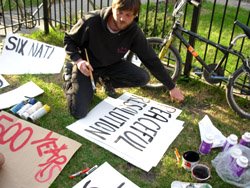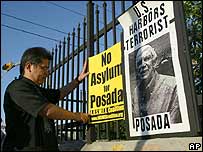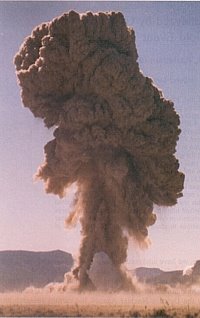 The Great American Boycott 2006, A Day Without An Immigrant” calls for a nationwide general immigration strike on May 1 to protest the current anti-immigration bill.
The Great American Boycott 2006, A Day Without An Immigrant” calls for a nationwide general immigration strike on May 1 to protest the current anti-immigration bill.
While there are debates about the exact nature of how the actions on May 1 should go, there is little doubt something is blowing in the wind.
This ought to be a May Day unlike any seen for a long time in the USA.The following article comes from the
New Standard.
Support Builds for Immigration Protests, BoycottAs May 1 action looms, undocumented workers discuss their power, solidarityby Kari Lydersen
Chicago; Apr. 28 – In the 2004 independent film A Day Without a Mexican, Californians woke up and all the Mexicans had disappeared. Lawns went untended, hotel rooms sat uncleaned, and countless other jobs performed by low-paid immigrants were left undone.
Immigrant-rights groups have frequently mentioned this film and the larger concept behind it during the past six weeks of massive pro-immigrant marches. In Chicago, where the first of the large demonstrations took place, a central theme has been waking the American public up to the economic importance of immigrants. Organizers say they want to show how much immigrants, including close to 12 million undocumented ones, contribute with their labor and with their buying power.
At the March 10 Chicago demonstration, during which more than 100,000 immigrants and their supporters hit the streets, a group handed out flyers for a hastily organized boycott of Miller beer. Demonstrators targeted Miller Brewing Co. because the company's PAC had donated $2,000 to Wisconsin Republican Congressman F. James Sensenbrenner Jr., sponsor of the harshly anti-immigrant bill that passed the House of Representatives last year.
Merchants on 26th Street, Chicago's main Mexican commercial drag in the Little Village neighborhood, said that by evening customers were refusing to buy Miller. The message reached beer distributors quickly, and by the following week officials from the company's Milwaukee headquarters had met with coalition organizers and put out a statement opposing the House's legislation.
"A lot of immigrants are not eligible to vote, but we have the purchasing power," said Salvador Cervantes, a member of the Chicago organizing coalition.
The idea amplified on April 10, when immigrant marchers in scores of cities and towns across the country pledged to refrain from shopping, working or going to school, wearing white T-shirts to symbolize their unity in creating a "day without immigrants."
A boycott on May Day has likewise been called in many cities across the country as part of pro-immigrant demonstrations. Called a paro in Spanish, the term is generally understood to mean both refusing to buy and refusing to work or go to school.
But the plan for a paro is not universally endorsed by all immigrant-rights groups. In Chicago, the organizing coalition known as the Movimiento 10 de Marzo, or the March 10 Movement, decided not to call for a boycott or general strike in the city, largely because of the involvement of labor unions that said they could not legally endorse such an action because their contracts prohibit them.
The question of whether to participate in nationwide calls for a May 1 boycott was hashed out at a contentious April 22 meeting, where the local coalition decided to support calls for boycotts in other cities, but refrain from a boycott in Chicago.
"We consider it a matter of wording," said Jorge Mujica, Illinois secretary general for the Democratic Revolution Party (PRD), a Mexican political party and one of the central coalition organizers. "If people are marching all day, they're not working, buying things or going to school. But since we have the unions, we can't call a boycott or a strike. We'd rather have labor on our side than call for a boycott. As for the national and international boycott, we think it's beautiful."
But some organizers described this as caving in to unions and politicians that were pushing for a more moderate stance.
"I wish the unions had stayed out of it and let people celebrate May Day the way they wanted," said Rafael Cervantes, an activist from Monterrey, Mexico who has lived in Chicago for decades. "The boycott was a symbol for people, an icon, a way to say we matter, we are an important cog in this machine, we produce and we consume. It's ironic that the unions are saying they could not support it because it would be illegal, but the whole reason we're marching is that people are here 'illegally.'"
Tom Hansen, founder and director of the Mexico Solidarity Network, a grassroots organization working for social change on both sides of the US-Mexico border, said the boycott is only one example of the larger ideological battle that is going on in the immigrant-rights movement. "The reformists want to 'manage' the movement with a lot of US flags and a discourse about family values, et cetera," Hansen told The NewStandard. "The more progressive elements want to move the discussion to one about exploitation, labor rights and the meaning of citizenship."
On April 24 union leaders held a press conference supporting the march and framing it as not only about immigration but about rights for all workers. They said a boycott was beside the point for the labor issues they wanted to highlight.
"We're not even putting it into the equation," said Moises Zavala, a Chicago organizer for the United Food and Commercial Workers (UFCW). "This is the day to recognize our labor history and bring it full circle. In Chicago we're not endorsing a boycott; we're out to march to show our numbers and recognize the importance of May Day."
Teamsters organizers said that rather than discussing a strike or boycott, they were trying to get employers on workers' side; helping employees petition their employers for time off or paid holidays to attend the demonstrations.
In Los Angeles, where other mass protests are planned, some groups will be carrying out work stoppages and boycotts and attending a daytime downtown march. Others who plan to go to work and school will attend a separate demonstration in the late afternoon.
Thousands of truck drivers working out of the Port of Los Angeles and cab drivers who serve Los Angeles International Airport are expected to strike for the day or possibly the week.
"If truckers aren't trucking, the port isn't working," said Los Angeles attorney and organizer Jim DeMaegt. "If cab drivers don't drive, LAX will be shut down. Nobody knows precisely what will happen, but there is a lot of support."
DeMaegt thinks a massive strike would force policy change faster than some other types of actions. "We say a day without shopping is good; going to speeches, going marches is good," he told TNS. "But stopping work – a day without workers will close the country. A day without goods going in and out of the ports and airports of the US, and we'll have a policy change within a week."
The truckers and cab drivers are organized but are not members of official labor unions, giving them the freedom to strike without worrying about legal issues binding unions.
The truckers and cab drivers are protesting against rising fuel prices and low pay, along with calling for immigration reform.
DeMaegt said local Teamsters officials are not supporting a work stoppage but support the overall mobilization.
Aquilina Soriano-Versoza, executive director of the Pilipino Workers' Center, noted that many of their members are home-healthcare workers, so they don't want to endanger their clients by skipping work; but they will support the mobilization nonetheless.
"They can't leave their patients, but they're in solidarity," Soriano-Versoza said. "There are a whole range of ways people can participate."
She noted that many employers, particularly in the Koreatown garment industry, have given their workers the day off thanks to organizing by community groups and employees.
Alexis Lanza, an activist with the Chicago group La Voz de los de Abajo (The Voice of Those Below) and an immigrant from Honduras, said he supported the call for a one-day boycott. "I think it would have been good if the US united on that," he said. "But there are lots of interests, unions and different groups, and it's not easy to balance those things."
Lanza would prefer long-term boycotts of products from companies that donate to anti-immigrant politicians or promote policies that hurt Latin Americans through international trade or employment policies. The Chicago committee discussed proposals for a long-term boycott of Coca-Cola, with its notorious human-rights record, and a local Mexican cheese company that buys from Rep. Sensenbrenner's state, Wisconsin. But those proposals were not adopted.
"Calling a boycott for just one day strategically doesn't have that big an impact; it's symbolic," said Lanza. "The next day you'll be buying the same products again."
Lanza thinks even without an official boycott, the demonstrations will make immigrants' economic power clear. "If you're calling on people to close their businesses during the march, that's like a boycott, except you're not calling it that," Lanza said.
Some groups in other cities have not endorsed the boycott out of fear there will be a backlash against immigrants or that workers will lose their jobs for skipping work. But in Chicago, where many workers fired for participating in the March 10 demonstrations were reinstated after immigrant organizers threatened to protest workplaces, advocates say they are not that worried.
"I really feel this time around nobody is going to get fired," said Mujica. "We have prepared this so well with the letters for employees to give to their employers." He noted the group is distributing letters in several languages for workers to download and use to explain their cause while formally requesting time off.
In Arizona, the coalition that organized a 100,000-strong protest on April 10 in Phoenix waffled about supporting a boycott. Last week, the Somos America (We are America) coalition announced it was supporting demonstrations and other forms of protest, but not endorsing the boycott due to fear of a backlash and concern for immigrants' job security.
But, according to the group's chairman, Roberto Reveles, who spoke to the Arizona Republic, the recent arrests of 1,187 undocumented immigrants in federal raids on pallet maker IFCO Systems locations in 26 states including Arizona, spurred the group to change its mind.
Reveles told the Republic that his group wanted "to make a statement against the latest raids," which came "at a time when they should be working toward immigration reform rather than instilling additional fear in the lives of undocumented workers and their families."
The success of the boycott, according to Hansen of the Mexico Solidarity Network, will depend "on how many people participate, what the impacts are and, most importantly, the kind of political consciousness that accompanies the tactic."
"The idea is to change hearts and minds," he said, "and to give immigrants a sense of their power. This is particularly important for a group that has been repressed and exploited for so long, on both sides of the border. A change in the collective appreciation of what is possible is the real goal of the boycott."
© 2006 The NewStandard. All rights reserved. The NewStandard is a non-profit publisher that encourages noncommercial reproduction of its content. Reprints must prominently attribute the author and The NewStandard, hyperlink to http://newstandardnews.net (online) or display newstandardnews.net (print), and carry this notice. For more information or commercial reprint rights, please see the TNS reprint policy.




